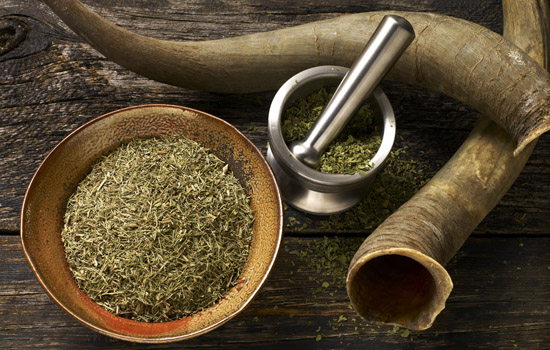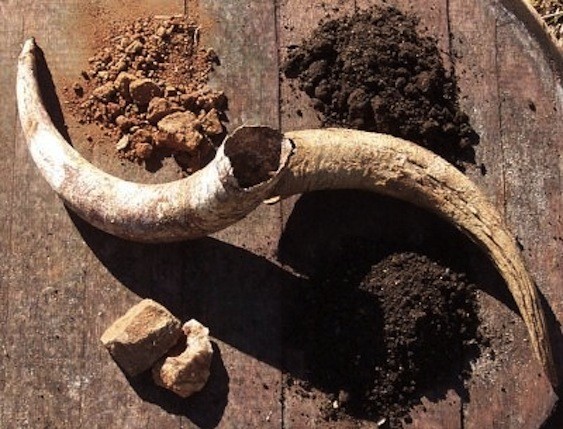When the moon is in the seventh house, and Jupiter aligns with Mars, this is the dawning of the age of Aquarius…and time to harvest your grapes! At least, according to biodynamics.

Cow horns, fruit days and moon cycles – all part of biodynamic agriculture!
Biodynamics; it sounds like something from the L. Ron Hubbard school of winemaking. But no, it’s actually a rigorous form of organic farming that links conditions of the physical world (i.e. the field, weather, seasons, etc.) to the greater spiritual forces of the cosmos. And now you know why some folks think it’s just plain wackadoo.
Whatever you think of it, though, biodynamic winemaking is catching on all over the world as more and more viticulturalists (the folks who grow the grapes) search for better farming techniques in an effort to produce better grapes and thus better wines. Chances are you’ve tried some biodynamic wine yourself, whether you realized it or not.
A scientist, sociologist and philosopher walks into a conference…
Sounds like the beginning of a bad joke, but that’s just what happened back in 1924 when an Austrian scientist and philosopher (notice I didn’t say he was a farmer or biologist) named Rudolf Steiner presented a series of lectures at an agriculture conference. Steiner looked at the world around him and was convinced that modern farming methods including the rampant new use of toxic chemicals and heavy machinery were going to destroy the earth and its crops.

Would you take farming advice from this man? It’s Rudolf Steiner, founder of biodynamics.
As an antidote, he proposed a new system of farming practices that views the farm (or vineyard, as the case may be) as a single organism that requires biodiversity in the form of crops, soil, livestock and other fauna, in order to thrive. Once in balance, all those things, said Steiner, would come together in concert to create a healthy, self-sustaining ecosystem that would have no need of artificial additives like pesticides or fertilizer in order to be healthy and productive.
That sounds pretty reasonable, right? Sort of like holistic medicine where, instead of gulping down Nyquil when you get a cold, you try to prevent yourself from getting it in the first place by building a strong immune system, and pop a few vitamins and Echinacea if you do catch it.
Astrological agriculture…
Here’s where things get a little New Age-y. Steiner prescribed several “preparations” to be used in the field at various times of year that sound like they come out of an imaginative cult handbook. One of my personal favorites involves putting yarrow blossoms into a deer bladder, hanging it to dry in the summer sun, burying it until spring and then mixing it into manure as a fertilizer. That’s a lot of steps, but the finished mixture is supposed to stimulate potassium, silica and selenium-activating bacteria, all of which should help vines flower and fruit. When you think about it that way, it’s kind of like a petri dish of beneficial microorganisms writ large. Or über-composting.

Biodynamic agriculture requires all sorts of unconventional composting and preparations.
Oh, and did I mention there is also a cosmological planting and sowing calendar? To be biodynamic, Steiner said that you had to follow a stringent regimen guided by the sun, moon and stars as well as the seasons, and that there were certain days that were better for certain activities in the field, such as irrigating, pruning and harvesting. To me, this sounds like a plant horoscope, but there is something commonsensical about it, too.
Steiner’s system actually draws on ancient farming techniques that were guided by, what else, the seasons and the heavens. I also think about it like this: the sun and moon are strong enough to create the ocean tides, not to mention affect the movement of our entire planet, so why wouldn’t they pull the water in the ground and the vines as well? Haven’t you ever heard anyone say, “It must be a full moon!” to account for a person acting unusual? In the same way, though certain aspects of biodynamics seem downright superstitious, there’s still a spot of truth to it.
Being biodynamic isn’t just a matter of following all these rules. As I mentioned, you have to be completely organic as well, but you also have to develop your vineyard and practices biodynamically for years before being certified by one of two organizations, Demeter or Biodyvin. So no matter what you think of the actual practices themselves, you have to admit that farmers who decide to go this route are making a major commitment.

Biodynamics may sound hippie-dippie, but there’s some good reasoning behind it, so give it a chance!
As they say, though, the proof is in the pudding, so try a few of these widely available biodynamic wines and judge for yourself whether there is anything to biodynamics, and if you want to learn more about it, check out this site.
Biodynamic Wines To Try
Ampelos Cellars 2011 Lambda Pinot Noir: Earthy but with bright cherry notes, this red is from one of my favorite producers in Santa Barbara. You should be able to find this or one of their other wines in your nearest Whole Foods.
Benziger Family Vineyards 2011 Oonapais Sonoma Mountain Red: One of the pioneers in biodynamics in California, Benziger is near the town of Glen Ellen in Sonoma County and offers the best winery tours explaining how biodynamics work. Try one of the big, bold red wines they’re known for, like this Bordeaux blend.
Olivier Pithon 2013 Mon P’tit Pithon Rouge: Olivier Pithon hails from a great Loire winemaking family, but set up shop in France’s far south Roussillon region to make biodynamic wines. He’s one of the area’s most exciting young producers, and you’ll see why when you taste this lively, food-friendly Grenache (though I also like the Laïs line of wines that’s named after his pet cow!).
Quartz Reef Méthode Traditionelle Brut: Like Rudolf Steiner, winemaker Rudi Bauer is Austrian, but he’s made New Zealand his home for a few decades now and is one of the major proponents of biodynamics there. Though he makes some great Central Otago Pinot Noirs, try his distinctive sparklers, like this champagne-like brut.

